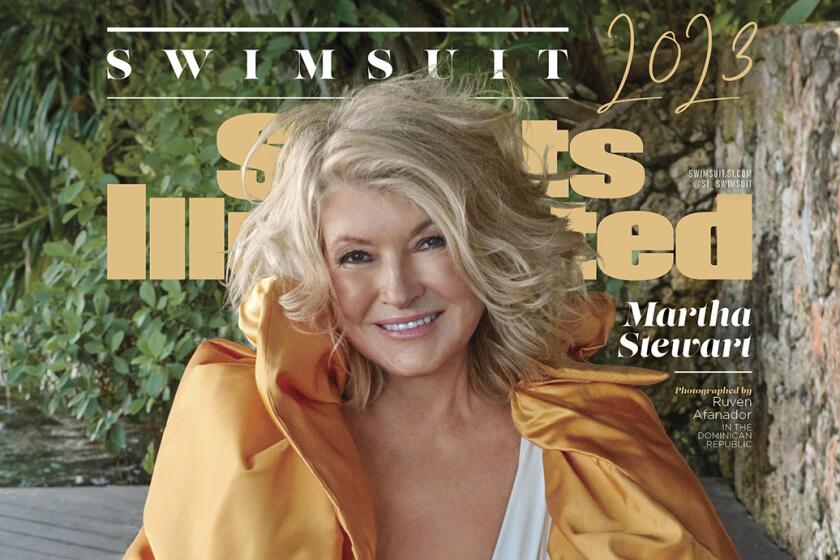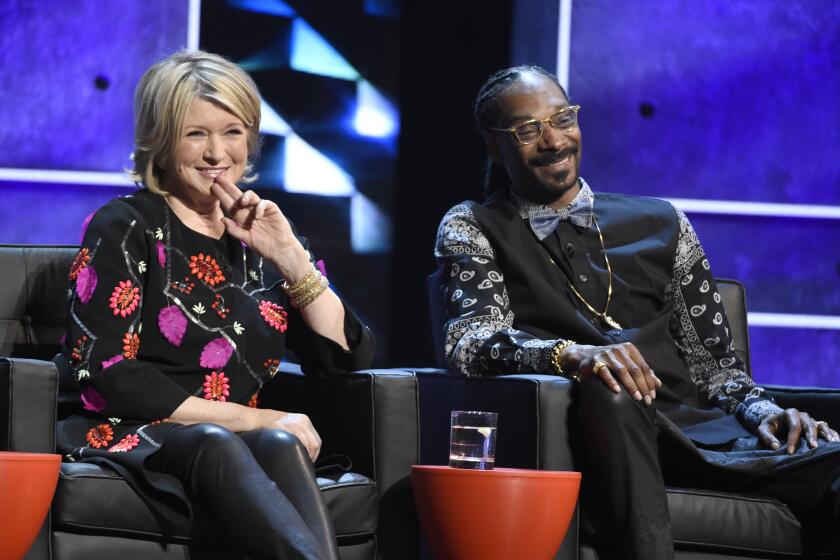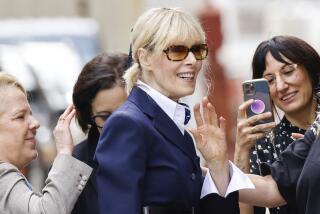Martha Stewart is an ‘unreliable narrator’ but also ‘a visionary,’ documentary director says

The way Martha Stewart sees it, her life story is pretty simple.
“Here’s this girl from a family of eight in Nutley, N.J., living modestly, who gets a good idea, builds it into something really fine and profits from it,” she says in “Martha,” a documentary premiering Wednesday on Netflix. Then, Stewart continues, she “falls in a hole” and has to climb out of it.
“Martha” offers a slightly more nuanced version of this journey, showing how Stewart overcame her humble origins to create a multimedia lifestyle company worth billions by, as she once put it, “celebrating something that’s been put down for so long.” But Stewart’s business success also made her a target. Her empire began to unravel in 2004, when she was convicted of obstruction of justice charges in a heavily publicized trial — dubbed a “b— hunt” — that seemed to be as much about her personality as the criminal code.
Martha Stewart is the oldest model to grace the cover of Sports Illustrated’s swimsuit edition. She called the milestone ‘a testament to good living.’
Directed by R.J. Cutler, “Martha” takes a revealing look at Stewart’s difficult upbringing, her contentious marriage to publisher Andy Stewart, her brief but transformative stint in prison, and her successful rebranding as a savvy octogenarian influencer and Snoop Dogg collaborator. It features a probing interview with Stewart, who is by turns cagey and bluntly honest. It also includes intimate photos, diary entries and letters from Stewart’s personal archive.

“Martha” doesn’t gloss over Stewart’s prickly, demanding personality, but it also makes the case that she was unfairly maligned — and ultimately prosecuted — because of her gender. Over the last few years, popular culture has been offering sympathetic reappraisals of scandal-plagued women from the not too distant past like Monica Lewinsky, Britney Spears and Pamela Anderson. Finally, it’s Stewart’s turn for a reassessment.
“She’s a visionary,” said Cutler in a Zoom interview. “And at every step of the way, there was a man — or a group of men — telling her she was wrong.”
The idea for the project began several years ago when Stewart and Cutler found themselves at dinner together. They spent hours talking about her background, including her upbringing in a working-class Polish American family where money was so tight, she turned to modeling as a teenager to help her parents make ends meet. Cutler was struck by how Stewart’s experiences differed from the “childhood of privilege and formality” he had imagined, based on her patrician image.
Imagine attending a dinner party hosted by Martha Stewart and Snoop Dogg, an unlikely pair — possibly the most unlikely besties ever.
Culter left their conversation convinced that “there was an important story to be told about American womanhood in the latter part of the 20th century, and that Martha would be a great conduit into that,” he said. And she was eager to tell her story. Cutler has made several documentaries about high-profile celebrities including “Billie Eilish: The World’s a Little Blurry” and the forthcoming “Elton John: Never Too Late,” premiering on Disney+ in December.
After several meetings, including one over lunch at Stewart’s office — “I can still taste the salad dressing,” Cutler said — they began to work together on “Martha.”

The famously controlling businesswoman, now 83, ultimately sat for a series of interviews, first over Zoom, then in person over five, eight-hour days at her home in Maine. (Cutler also filmed her roaming the pristine grounds of her estate in Bedford, N.Y.). Their conversation forms the backbone of “Martha,” which portrays Stewart as a woman of many contradictions. (She is the only person interviewed on camera, though we hear audio commentary from an array of friends, family and writers.) She alternates between spit take-inducing candor (Stewart says she’s glad the New York Post reporter who covered her trial is dead) and intense caution when it comes to discussing her feelings. Although justifiably proud of becoming the first self-made female billionaire in American history, she admits she still doesn’t have an answer to the question, “What is more important, a marriage or a career?”
The interview reveals “so much about Martha factually, but you also learn so much about her as a character,” Cutler said. “You see how challenging it was for her to confront so much of her own story. It’s also a window into her as an unreliable narrator.”
There are several moments in which Stewart comes off as hypocritical and lacking self-awareness. During a discussion of her husband’s infidelity, she says, “If you’re married and your husband starts to cheat on you, he’s a piece of s—.” Cutler, off camera, brings up the fact that she too,had an affair early in her marriage. “But I don’t think Andy knew about that,” she says of the brief liaison with “a very attractive Irishman.” She also shares her fond memory of making out with a handsome stranger while on her honeymoon in Italy. She tells Cutler she was merely having an emotional experience, not being “ naughty [or] unfaithful.”
Nearly as illuminating as the interview are the letters, diary entries and other materials from Stewart shared from her personal archive, which capture the fiery emotion roiling beneath her icy facade. In an impassioned missive written to her husband as their marriage was collapsing, she talks of burning down their home and wishing that her plane would crash.

We also see a previously unaired video of Stewart, recorded at home a few weeks before her sentencing in 2004, in which she berates an employee for using the wrong knife to slice oranges. Some of the harshest criticism comes from her friends, who describe Stewart as ruthless; they say that people felt abused by her and liken her to a great white shark.
But “Martha” is also clear-eyed about the way that Stewart’s gender made her a target for scrutiny that men in comparable positions rarely, if ever, face. This double standard is especially apparent in the insider trading scandal that engulfed Stewart after she sold off shares in ImClone Systems, a biopharmaceutical company, in 2001, just as the FDA denied approval of an experimental drug the company was developing. The trial became a media circus, as did her stint at a prison in West Virginia nicknamed “Camp Cupcake” because of its supposedly lenient conditions. (Stewart talks about being strip searched and subject to solitary confinement for a minor infraction.)
The film argues that the prosecution against Stewart, led by then-U.S. Atty. James Comey, was selective and employed “a strategy of putting her on trial for being a b—,” Cutler said. The star witness was an assistant who said Stewart once complained about the hold music when he answered the phone. “The kind of a— a man has to be to be put on trial for being an a— is a lot more than, ‘I told the assistant that I didn’t like the hold music.’”
Martha Stewart explains how she became friends, and then better friends, with Snoop Dogg. Comedy Central and some secondhand smoke helped seal the deal.
Despite this sympathetic take on her legal troubles, Stewart has been publicly critical of “Martha,” calling it “lazy” because of its focus on her trial. Cutler is not bothered by the pushback, saying that it took “incredible courage” for Stewart to trust him with her story.
“Of course, Martha would have made a different film than I made,” he continued. “On some level. I’m grateful that she pointed out that this is my film, and I have final cut.”
After a recent screening in the Hamptons, Culter said that Alec Baldwin came up to Stewart and told her how much more he liked her because of it.
“What everybody says to me is, ‘I relate to Martha Stewart in a way I’ve never related to her before,” Cutler said.
Ultimately, the documentary humanizes someone often viewed as an avatar of unattainable perfection. And, to borrow Stewart’s catchphrase, that’s a good thing.
More to Read
The complete guide to home viewing
Get Screen Gab for everything about the TV shows and streaming movies everyone’s talking about.
You may occasionally receive promotional content from the Los Angeles Times.









